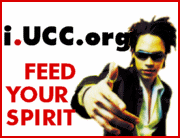'Who do you say that I am?'
Sermon preached at Emmanuel United Church of Christ
Akron, Ohio
September 17, 2006
Andrew G. Lang
Readings:
Proverbs 1:20-33
Mark 8:27-38
Listen for the Word of God in the Gospel according to Mark, chapter 8, beginning at the 27th verse:
Jesus went on with his disciples to the villages of Caesarea Philippi; and on the way he asked his disciples, “Who do people say that I am?” And they answered him, “John the Baptist; and others, Elijah; and still others, one of the prophets.” He asked them, “But who do you say that I am?” Peter answered him, “You are the Messiah.” And he sternly ordered them not to tell anyone about him.Good morning!
Then he began to teach them that the Son of Man must undergo great suffering, and be rejected by the elders, the chief priests, and the scribes, and be killed, and after three days rise again. He said all this quite openly. And Peter took him aside and began to rebuke him. But turning and looking at his disciples, he rebuked Peter and said, “Get behind me, Satan! For you are setting your mind not on divine things but on human things.” He called the crowd with his disciples, and said to them, “If any want to become my followers, let them deny themselves and take up their cross and follow me. For those who want to save their life will lose it, and those who lose their life for my sake, and for the sake of the gospel, will save it. For what will it profit them to gain the whole world and forfeit their life? Indeed, what can they give in return for their life? Those who are ashamed of me and of my words in this adulterous and sinful generation, of them the Son of Man will also be ashamed when he comes in the glory of his Father with the holy angels.”
My name is Andy Lang, and I want to thank you for accepting me into your church family this morning while Pastor Jay is on a study tour to Scotland and France.
Although I have to confess that when I saw what readings the lectionary appointed for this Sunday I was tempted to rush to the airport and follow Pastor Jay to Scotland, or even farther if possible. The lectionary—because it’s a discipline of reading through most of the Bible in a three-year cycle—sometimes confronts the preacher and the congregation with uncomfortable texts that we would avoid if we could.
And at first glance, today’s readings from Proverbs and Mark are not comfortable words. Proverbs: “Because I have called and you refused, have stretched out my hand and no one heeded.... I will laugh at your calamity, I will mock when panic strikes you, when panic strikes you like a storm....”
When I read this, panic nearly struck me like a storm. I have to preach on this??? Well, I thought, maybe I’ll just bypass the Old Testament and go straight to the Gospel. Surely, here there will be comfortable words! But no: after subjecting Peter to a tongue-lashing so extreme that in our day Peter could have sued Jesus for creating a hostile work environment, our Lord then sets an impossibly high bar for his disciples: “If any want to become my followers, let them deny themselves and take up their cross and follow me.”
The reading from Mark is really a hinge on which this Gospel turns. Up to this point Jesus has been travelling through Galilee instructing his disciples and performing miracles that demonstrate his power. Now they have crossed the border into the Roman province of Judaea and have reached its capital, Caesarea Philippi. Though the disciples don’t know this yet, they’ve begun the final stage of a journey that will take them south to Jerusalem, where Jesus will be betrayed, condemned, and crucified. But here in Caesarea Philippi, Jesus (who wasn’t the kind of public personality who frequently consulted the opinion polls) puts an unusual question to his disciples: who do people say that I am?
The popular opinion, the disciples answer, is that Jesus is a great prophet like John the Baptist or Elijah. But the followup question is more difficult. It puts the disciples on the spot. Who do you say that I am?
Who do you say that I am? This is the classic question of Christian theology that echoes through the centuries. Who is Jesus? Is he a prophet? A teacher? A spiritual reformer or even the inspired founder of a new religion like Buddha, Mohammed or L. Ron Hubbard?
None of the above, says Peter. Yes, a prophet, teacher and reformer—but more than this. “You are the Messiah,” Peter says. In Greek, “the Christ.”
The Christ! Now, in Judaism this was an image of great power. The Christ was the anointed one, the one anointed by God as king to reestablish the Kingdom of Israel. The Christ was a new David who would liberate the people from foreign rule. So it’s no surprise that Peter was in for a culture shock when, moments later, Jesus reveals for the first time that “the Son of Man must undergo great suffering, and be rejected by the elders, the chief priests, and the scribes, and be killed, and after three days rise again.”
Must undergo suffering. Must be rejected. Must be killed. This was not the orthodox image of the Christ! For Jews living under Roman occupation, liberation by God’s Messiah was about the projection of power—very much like the apocalyptic revenge fantasies in our culture about an “Armageddon” in which God’s plan for history is supposed to be fulfilled in a big military operation in full technicolor. There's no room for defeat in the Messianic plan.
So what was Jesus talking about? Suffering? Rejection? Death? What kind of plan is that? Not a very good one, especially if you do a cost-benefit analysis. So Peter “rebukes” Jesus, and Jesus corrects him—but not gently. “Get behind me, Satan! For you are setting your mind not on divine things but on human things.”
And what does it mean to follow this Christ—a Christ who does not destroy his enemies but subjects himself to their power? “If any want to become my followers, let them deny themselves and take up their cross and follow me. For those who want to save their life will lose it, and those who lose their life for my sake, and for the sake of the gospel, will save it. For what will it profit them to gain the whole world and forfeit their life?”
This is not the power of positive thinking! And in our culture it’s an intolerable heresy. We want more. More power, more freedom, more security, more health, more success, more efficiency, more property, more information, more knowledge ... even more spirituality. You only have to watch television to realize that spirituality is for sale just like any other commodity, and it’s not only the “prosperity preachers” who are guilty. The commodification of religion tempts all of us. I subscribe to an email newsletter published by an organization in San Francisco called “Q-Spirit” and last week I was invited to a retreat titled “Opening to Breath, Opening to Purpose.” Here’s what I was promised: “With the enhanced, cumulative power of four consecutive breathwork sessions, and its clear and supportive focus on life purpose, this retreat has been getting rave reviews on both coasts. Numerous participants have told us that the retreat has catapulted them into powerful new levels of awareness, healing, and purposeful action in their lives.”
Cumulative power! Clear and supportive focus! Rave reviews! How I would love to be “catapulted into powerful new levels of awareness, healing, and purposeful action.” And who wouldn’t want a dose of this spiritual Viagra? Like everyone else, I want more. But Jesus seems to be saying that more is less, and less is more. “For those who want to save their life will lose it, and those who lose their life for my sake, and for the sake of the gospel, will save it.”
That's not necessarily the answer I want to hear when Jesus puts this question (this very dangerous question) to me: “Who do you say that I am?”
All of us know ... all of us ... what it means to lose a part of our life. The death of someone who was so close that the loss makes you feel as if a piece of you has fallen away, a divorce, a disappointed hope, a struggle with mental illness, a prolonged experience of unemployment when sometimes it feels that even your sense of identity is on the line, as if there is no solid ground under your feet. I have my own list of losses, and perhaps you have yours. And all of these greater and lesser losses point to that inevitable loss at the end when perhaps we will be tempted to say, as Jesus said on the cross, “God, why have you abandoned me?”
Who do you say that I am? If I answer—“You are the Christ, but not the Christ I thought you were when I believed that my victory in life would come through the acquisition of security and the accumulation of power. You are the Christ whose divinity was revealed in your humanity, whose majesty was revealed in your humiliation, whose life was revealed in your death”—if I can say this and believe it, then I can also believe the One who says, “if you lose your life for my sake, and for the sake of the gospel, you will save it.”
But this letting go of my fear of loss is almost impossible. As John Calvin puts it, how could any of us possibly “give our consent to be reduced to nothing” unless—unless—“God lives and reigns in us.” Confessing Jesus as Christ is our confession that he is paradoxically the Ruler and Savior who died a shameful death but rose again on the third day, as he promised. That he lives and reigns now and lives and reigns in us, in this congregation, in Word and Sacrament, in the love we have for each other and for the world we serve in Christ’s name. Brothers and sisters: in Baptism we already have died in Christ so we can rise again in Christ, so that now “God [truly] lives and reigns in us.”
“You are the Christ.”
“The confession is short,” says Calvin, “but it embraces all that is contained in our salvation, for the title Christ, or Anointed, includes both an everlasting Kingdom and an everlasting priesthood, to reconcile us to God, and, by expiating our sins through his sacrifices, to obtain for us perfect righteousness, and having received us under his protection, to uphold and supply and enrich us with ... [his] blessings.”
Christ protects us, upholds us, supplies us, enriches us. So we can return to that difficult reading from Proverbs, which ends in this way:
“...[B]ut those who listen to me will be secure, and will live at ease, without dread of disaster.”


